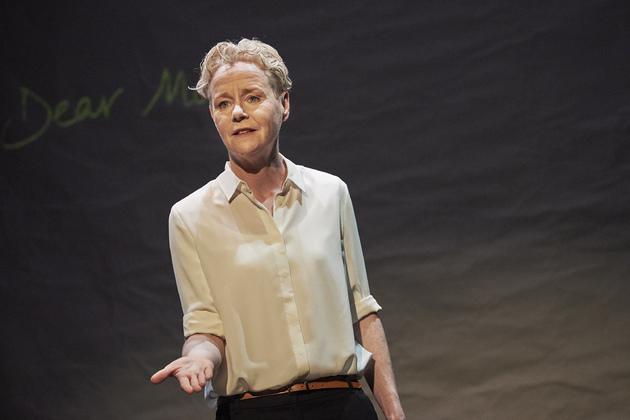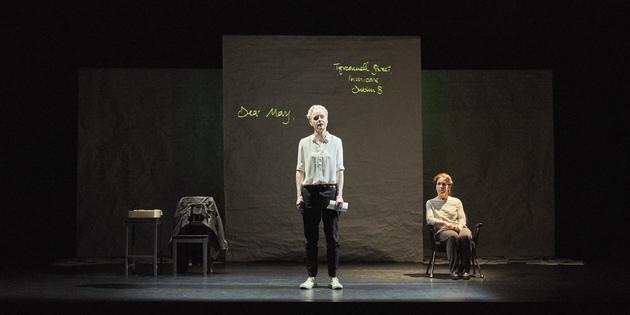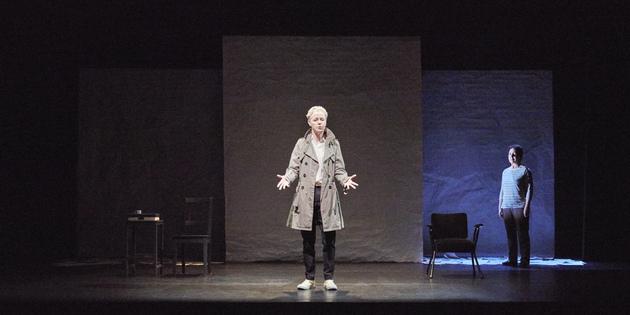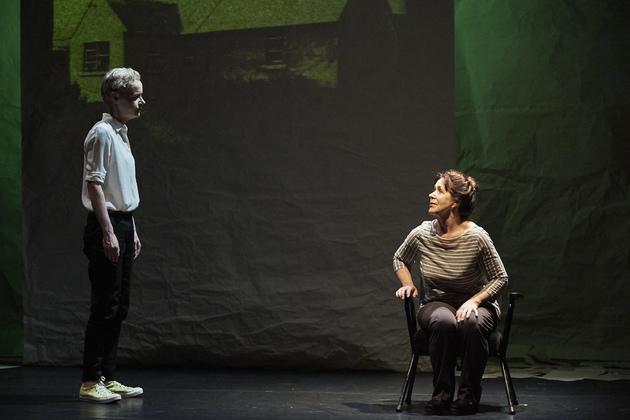|
Adoption in Ireland: 'We're still going through it, we're still carrying the shame'
By Aoife Barry
WHEN ACTRESS AND playwright Noelle Brown was 35, she decided to search for her birth family. Born in Cork’s Bessborough mother and baby home – or mother and baby institution, as she feels it should be called - Brown was adopted when she was eight weeks old. Her adoptive family was always very open about her past. But when she went looking for her own personal documentation in her mid-30s, she hit a brick wall. Her experiences as an adopted person in Ireland have led to her play Postscript, which looks at the reality for a person like Brown trying to find their birth family in Ireland. It’s a tale of secrets, lies, identity, and lingering questions. Brown tells TheJournal.ie that she believes a stigma exists around adoption and mother and baby homes in Ireland which can affect people throughout their lives. She is also highly critical of forthcoming legislation around adoption in Ireland. “It hasn’t changed as much as we think and I think that’s what I’ve had to come to terms with, particularly in the past year,” she says of adoption stigma. “When I was growing up it was very much [in a hushed voice] ‘adopted’… we didn’t say it out loud, you were kind of stigmatised.” The religious attitudes towards children who were adopted, and their mothers – who had given birth ‘out of wedlock’, a social shame – lingered. “The belief was because your mother had done something ‘wrong’ that you would as well in your life,” says Brown. She grew up in Ballintemple in Cork, with two older brothers who were not adopted. In 1987, she moved to Dublin, where she has lived since. Brown was always told she was born in Dublin “and shipped to Cork”, but found out that she was actually born in Bessborough, half a mile from where she grew up. “That kind of stuff, you just go Jesus… you don’t know what’s true and what isn’t true,” she says of the knots of untruths she has been forced to unravel. ‘We really are just this nuisance’ When she tried to trace her birth family, she says she “was really treated like… I was this mistake from the 60s turning up. And that was a real shock to be honest because I thought we had moved on as a country, but we hadn’t.” She has felt at times that she and other adoptees from this era “really are just this nuisance”. For example, she’s critical about the situation in Tuam, where the remains of children from a mother and baby home lie: “We’re building a peace garden before it’s even been excavated, before any investigation happens.” “What does that say about our attitude to adopted people and to birth mothers and to our past?” she asks. “It’s kind of extraordinary and I find it very shocking, and that’s why I feel doing this play now is really important.” Adoption bill Initially she didn’t set out write a play about adoption – she was to look at moving house, but the subject of adoption kept coming up. Now, she realises it’s important to have her voice out there. “There aren’t many narratives of adopted people out there, either. It’s something people don’t know about unless you are adopted,” she says.
Brown says she and others like her are “always battling between being emotional, angry, and trying to stay calm” while trying to get hold of their documentation. “And it’s just this lack of humanity is the only way to describe it. It’s like ‘what do you want your rights for?’” She is critical, too, of Minister Katharine Zappone’s Adoption (Information) and Tracing Bill 2016. It will allow for adopted people to seek out details that were previously impossible to obtain under privacy laws. Under the terms of the bill, the adopted person will be given information that relates solely to them as soon as possible. However, before a birth cert is handed over, the adopted person will be required to make a statutory declaration to respect the privacy of their birth parent and not attempt to contact them unless it is through the official channels of the information and tracing services, which will be administered by Tusla. Similarly, a birth parent will be able to seek information about the adopted person and be able to make contact, if the adopted person agrees to do so. The group First Mothers, which supports mothers whose children ended up in adoptive care, has also been critical of the minister’s proposals. Brown believes the legislation is “sacrificing adopted people’s identity over secrecy”. She says that people might want information, but they don’t necessarily want to “run around the country searching for your birth mother”. “We’re looking for information, not contact,” she says. “I didn’t know how difficult it was going to be. I had absolutely no idea and emotionally challenging, and until you do it you don’t know.” Finding her past When she started tracing her birth certificate, Brown got in touch with Barnardos, which gave her a number in Cork to ring. It took months to finally get through to a nun, who was “so cold, and rude, and horrible” to her. It was a difficult experience for Brown, as she describes being “really vulnerable” at that time. “It’s a really difficult thing to do and you kind of underestimate the emotion of what it brings up,” she says now. The nun was “totally unhelpful so I backed away and I stopped for about six months”, she says. Then after about six months she told Barnardos what had happened, “and they were absolutely furious”. “I was shocked at how awful the experience was – why am I being treated like this?” she says of the nun’s behaviour. “The nun was so horrible, and just that level of ‘no’, I found that quite shocking.” Barnardos told her she did have a right to her file, and got in touch with the nun. But rather than give her basic information, the nun went and contacted Brown’s birth aunt. “It was a lot more than I had bargained for, the details of it and just dealing with it,” she says of the information the nun handed over, adding she was helped throughout by Barnardos. Brown went on to meet her birth aunt and her uncles but got a lot of information that “emotionally I had to take on board and figure out”. “In the end I got only half the information because I got my birth mother’s story and her family, but no information about my father at all. He seems to be a bit of a mystery,” says Brown. It’s a sign of how the search for your birth family is rarely an easy one.
Going through all of this has made Brown realise ”it’s not something that you get over”. And though she clarifies that it’s not the end of the world, it is something she has to live with. “I thought I’d do loads of counselling and that would be the end of it – I’ll be fine, but you [aren't]. And that’s hard because it is a trauma that you carry with you. And I think that gets missed sometimes,” she says. She’s glad she did it, but describes what it is like to search for birth mother that you have never met as an adult: “The sense that this is a stranger you’re tracing, there’s no connection here, but emotionally there is when someone has had you for 8 weeks and carried you for nine months, you can’t eradicate that.” She did a lot of the work on her own, with the support of her family, but acknowledges the process was at times hard on them and her birth family. “You don’t want to upset anybody, that’s the biggest thing.” The playwright says she never would have gone through with the play had it upset any family members, but they have been supportive about it. The play has also helped other people to speak – sometimes for the first time – about their adoption experiences. “People just come out of the woodwork to tell their stories and share their stories, and not pleasant ones. Very few positive ones,” she says of the chats that happen after each show. She gets messages online from people who were brought as babies to America, and want to know more about their identity. There are letters, too, from people who have a shared experience with her. She calls it a privilege to do a show that people connect with on such a level.
Postscript features letters from Brown to her mother, and from an ‘interfering aunt’ character. “It’s very funny as well – we got to mix up pathos and humour,” she says. “It’s like a detective story, really.” And that is essentially what Noelle Brown has had to be, a detective trying to uncover something important: the story of who she is. And all the while knowing there will be questions that will never get answered. People often ask her if doing the show has made her ‘feel better’. “I do to a certain extent but you’re also missing, you see the gaps in everything,” she reflects. “I am very glad that I wrote this piece with Michéle and very glad to be performing it, but it doesn’t answer all your questions, it never will. But as an exercise in saying it out loud, it’s amazing.” Contact: aoife@thejournal.ie
|
.
Any original material on these pages is copyright © BishopAccountability.org 2004. Reproduce freely with attribution.




